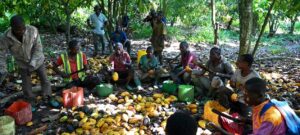 This article delves into the struggles faced by cocoa farmers in Ivory Coast as the global cocoa prices surge, impacting local farmers disproportionately.
This article delves into the struggles faced by cocoa farmers in Ivory Coast as the global cocoa prices surge, impacting local farmers disproportionately.
Expensive Cocoa – Rich Farmers?
The price of cocoa is rising, affecting producer countries as well. However, little of this increase reaches the farmers. They are facing challenges such as extreme weather, inflation, and a detrimental price guarantee.
Devastating Effects of Extremes
By the end of 2023, the warehouses in Ivory Coast should have been well-stocked. However, heavy rains pounded the trees during the cocoa bloom season in the summer. Farmers, at a loss, shared with the AFP news agency that the harvest turned out to be “catastrophic.”
The rain caused the blossoms to fall off, and the cocoa could not withstand this volume. Farmer Siaka Sylla described it as the “worst year” he has experienced in the business. The few fruits that did ripen often turned out rotten inside, a consequence of the heavy rain and prolonged humidity.
New Year, New Concern
Now, in the new year, drought is plaguing the cocoa plantations. Poor yields from West Africa are driving up world market prices, says Hélène Kouamé, a cocoa farmer who leads a cooperative that processes and exports cocoa within the country. Due to the scarce harvest, she now has to purchase cocoa at a higher cost.
She is forced to pay the farmers a price exceeding the level set by the state’s Coffee-Cocoa Board per ton. Ivory Coast is not only the world’s largest cocoa producer, but around 20% of the population works in this sector. However, Ivorian farmers do not benefit much from the increased prices. The majority of them live on less than €0.67 per day, while the major beneficiaries are the large international chocolate manufacturers.
Climate Crisis and Inflation Adding to Hardships
The poverty of the farmers in Ivory Coast is becoming a societal issue. Besides the more frequent extreme weather events, the high inflation makes it increasingly difficult for farmers to afford the high costs of pesticides and fertilizers.
This leads to a drop in harvests and challenges in paying for harvest workers. Consequently, child labor on cocoa plantations is also on the rise.
Price Guarantee Consequences
The state’s Coffee-Cocoa Board has been trying to support its farmers for a few years with a set price per season and a government premium of $400 per ton. However, experts point out that the farmers do not benefit from the current high prices due to the pre-harvest price fixed by the government.
Cocoa producer Hélène Kouamé shares the same sentiment. She believes Ivory Coast’s current policy leads to a “rock-bottom price.” She highlights that the set price is applicable from October 1 to March 31, a period in which market prices typically rise. She hopes that producers will benefit from a price increase during the next campaign in October 2024.

